By Azrung Fayaz, Doctor of Internal Medicine | MBBS, FCPS, MRCP
Updated on December 14, 2023
Published on December 14, 2023
Fact Checked

Get latest news, updates, and trends on mental well-being
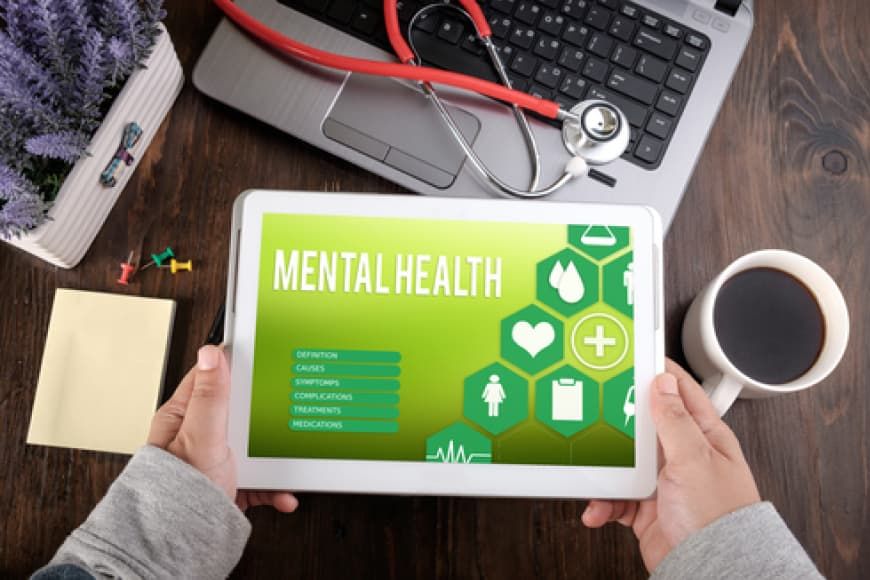
The holidays can bring stress, worry, and sometimes even loneliness. It’s a lot to juggle between the hustle of gatherings and tricky family situations.
Understandably, one-third of adults felt anxious during the holidays in 2022.1 That’s a significant increase from the previous year.
Luckily, mental health tech tools are here to help. This blog unwraps ten innovative tools to brighten your holidays. Let’s dive in.
Virtual Reality (VR) is a new way to help people feel less stressed. In one study,2 VR helped people feel 34% less worried and 32% less stressed. A review3 of 49 studies showed that this effect was comparable to routine talking therapies.
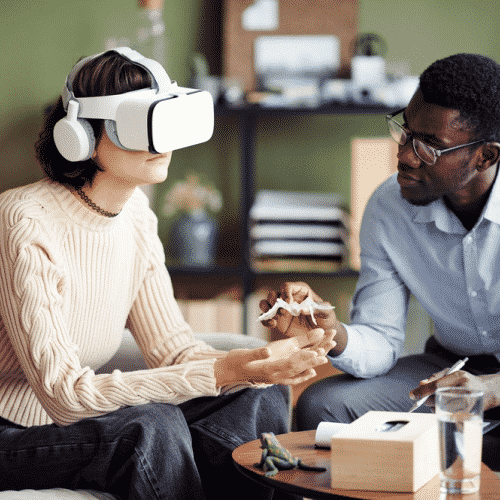
VR works to reduce stress by:
Mental health apps like Woebot and Wysa can help you with your feelings. A study6 including 2,518 people proved this. Likewise, another study7 that analyzed 22 different apps reported similar results. These benefits lasted up to six months, even after people stopped using their chosen app.
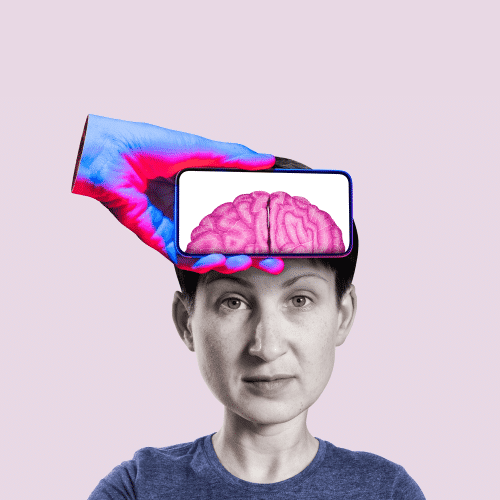
AI-powered mental health apps work because they adapt to your needs. When you first use the app, it asks you questions to understand your feelings. As you talk to the app, it learns about you. It also keeps track of how your mood changes. Then, the app uses this info to give you advice that’s right for you.
Telehealth platforms are like having a therapist’s office in your home. Given their convenience, the use of these platforms jumped to 77% between 2020 and 2021.8 Such platforms are particularly popular among older adults.9 In fact, 2.7 million older people regularly use telehealth platforms.10
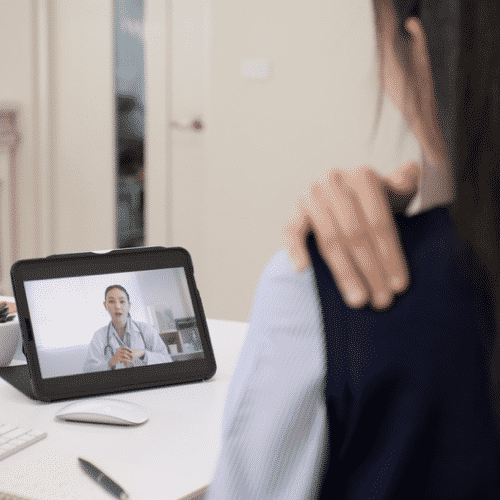
Other than saving the commute, telehealth platforms also offer other vital benefits. For example:

Digital pills are intelligent helpers approved by the FDA in 2017.11 They have tiny sensors that can track when you take your medicine. So they can give you a nudge on your phone or smartwatch to remind you to take your meds. When you take a pill, the sensor inside tells your phone that you took it. This is particularly useful for long-term mental health problems.
Did you know there’s a video game that doctors can prescribe? It’s called “EndeavorRx,” and it’s for kids aged 8 to 12 with ADHD.12 Games like this are research-proven to help with mental health problems.13
Such games are suitable mental health treatments. They take your mind off depressing thoughts and can be calming. In addition, most people enjoy playing them. So, they’re good for helping you control your emotions and feel better about yourself.
Apps like Symple keep an eye on how you’re feeling so you can manage your feelings. You can write down how you’re feeling each day. This is great if your feelings change a lot or if you have depression.
Over time, you’ll start to see patterns. You’ll notice what makes you feel good or what stresses you. Thus, you can focus on things that lift your mood while eliminating the stressful ones. This strategy is research-proven to boost your mood.14
Do you spend a lot of time on your phone? Apps like Moment, Offtime, Space, Freedom, and Flipd can help you use your phone more healthily.
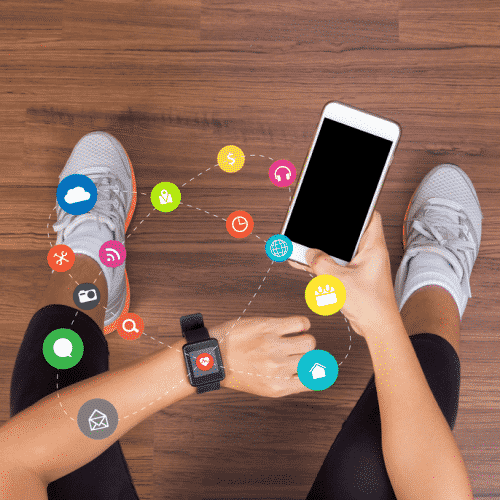
People who’ve used these apps can’t recommend them enough. They often report increased productivity. In addition, people with ADHD noticed similar benefits.
Wellness apps work by:
Apps like Insight Timer and Buddhify are helping people feel less stressed. This is because mindfulness is research-proven to improve mental health. For example, in one study,15 participants practiced mindfulness for five weeks. They reported feeling better, and these feelings lasted over three months. Likewise, another study16 found that 10 minutes of meditation daily produced similar results.
Mindfulness helps you think before you act. It also teaches you to notice your feelings without getting too upset about them. This means you can handle tricky situations, like family get-togethers, more calmly.
Apps like SleepCycle and Headspace or devices like Fitbit can help you sleep better. Studies show that these sleeping aids can improve sleep quality and duration.17
Your body heals when you sleep. So, improving your sleep can keep your stress hormones in check. Conversely, not sleeping enough can affect your mood.

Platforms like 7 Cups, TalkLife, and Big White Wall let you talk to people who understand you. These platforms help because:
During the holidays, things can start to feel too much. But remember, help is always available. With technology, you have a helpful friend on your phone. Whether diving into a fun virtual world or talking to a friendly app, these incredible tools are just a click away. They can remind you to take your medicines or connect you with people who understand you.
So, if you start feeling worried or overwhelmed during the holidays, these tools are here to help. They’ll help you calm down, get your energy back, and allow you to enjoy your holidays.
1. As Holiday Season Begins, America’s Stress Rises, But Less About COVID-19. https://www.psychiatry.org:443/news-room/news-releases/as-holiday-season-begins-americas-stress-rises. Accessed December 12, 2023
2. Orr E, Arbel T, Levy M, Sela Y, Weissberger O, Liran O, et al. Virtual reality in the management of stress and anxiety disorders: A retrospective analysis of 61 people treated in the metaverse. Heliyon. 2023;9(7). doi:10.1016/j.heliyon.2023.e17870
3. Oing T, Prescott J. Implementations of Virtual Reality for Anxiety-Related Disorders: Systematic Review. JMIR serious games. 2018;6(4). doi:10.2196/10965
5. Kothgassner OD, Goreis A, Kafka JX, Van Eickels RL, Plener PL, Felnhofer A. Virtual reality exposure therapy for posttraumatic stress disorder (PTSD): a meta-analysis. Eur J Psychotraumatol. 2019;10(1). doi:10.1080/20008198.2019.1654782
6. Oliveira C, Pereira A, Vagos P, Nóbrega C, Gonçalves J, Afonso B. Effectiveness of Mobile App-Based Psychological Interventions for College Students: A Systematic Review of the Literature. Front Psychol. 2021;12. doi:10.3389/fpsyg.2021.647606
7. Chandrashekar P. Do mental health mobile apps work: evidence and recommendations for designing high-efficacy mental health mobile apps. mHealth. 2018;4. doi:10.21037/mhealth.2018.03.02
8. Cantor J, McBain RK, Kofner A, Hanson R, Stein BD, Yu H. Telehealth Adoption by Mental Health and Substance Use Disorder Treatment Facilities in the COVID-19 Pandemic. Psychiatr Serv. 2022;73(4). doi:10.1176/appi.ps.202100191
9. Hao X, Qin Y, Lv M, Zhao X, Wu S, Li K. Effectiveness of telehealth interventions on psychological outcomes and quality of life in community adults during the COVID-19 pandemic: A systematic review and meta-analysis. Int J Ment Health Nurs. 2023;32(4). doi:10.1111/inm.13126
10. Kim KH, Lee SM, Hong M, Han KM, Paik JW. Trends in telemedicine utilization for mental illness during the COVID-19 pandemic: an analysis of a nationwide database in Korea. BMC Psychiatry. 2023;23(1). doi:10.1186/s12888-023-05258-x
11. Office of the Commissioner. FDA approves pill with sensor that digitally tracks if patients have ingested their medication. U.S. Food and Drug Administration. Published March 24, 2020. https://www.fda.gov/news-events/press-announcements/fda-approves-pill-sensor-digitally-tracks-if-patients-have-ingested-their-medication. Accessed December 12, 2023
12. Office of the Commissioner. FDA Permits Marketing of First Game-Based Digital Therapeutic to Improve Attention Function in Children with ADHD. U.S. Food and Drug Administration. Published June 17, 2020. https://www.fda.gov/news-events/press-announcements/fda-permits-marketing-first-game-based-digital-therapeutic-improve-attention-function-children-adhd. Accessed December 12, 2023
13. Bocci F, Ferrari A, Sarini M. Putting the Gaming Experience at the Center of the Therapy-The Video Game Therapy® Approach. Healthcare (Basel, Switzerland). 2023;11(12). doi:10.3390/healthcare11121767
14. Polhemus A, Simblett S, Dawe-Lane E, Gilpin G, Elliott B, Jilka S, et al. Health Tracking via Mobile Apps for Depression Self-management: Qualitative Content Analysis of User Reviews. JMIR Human Factors. 2022;9(4). doi:10.2196/40133
15. Ameli R, Sinaii N, West CP, Luna MJ, Panahi S, Zoosman M, et al. Effect of a Brief Mindfulness-Based Program on Stress in Health Care Professionals at a US Biomedical Research Hospital: A Randomized Clinical Trial. JAMA network open. 2020;3(8). doi:10.1001/jamanetworkopen.2020.13424
16. O’Donnell K, Dunbar M, Speelman D. Effectiveness of Daily Mindfulness Meditation App Usage to Reduce Anxiety and Improve Well-Being During the COVID-19 Pandemic: A Randomized Controlled Trial. Cureus. 2023;15(7). doi:10.7759/cureus.42432
17. Zhu H, Xiao L, Tu A. Effectiveness of technology-based interventions for improving sleep among children: a systematic review and meta-analysis. Sleep Med. 2022;91. doi:10.1016/j.sleep.2022.02.013